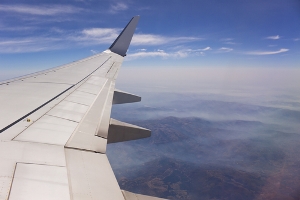How to Overcome Fear of Flying
7 high-flying tips to get you super calm above the clouds

"Please make them sit down! They're rocking the plane!" My mother's fear of flying was causing my 9-year-old self acute embarrassment.
"They're cabin crew; I think they know what they're doing!" responded my dad, a little less sympathetically than he'd sounded an hour before.
Back then I couldn't understand it; flying was fun, a chance to see the world as a superhero might (well, I was 9). I positively enjoyed bouncing around in turbulence.
My mother, not normally much of a drinker, became ever more glassy-eyed as the 'refreshment trolley' steadily depleted. "Save some for the other passengers," my sister would say.
"If God had meant us to fly, he'd have given us wings!"
"He has! They're steel and you can see them if you look out the window."
How fear of flying affects you
Since then I've learned, of course, that fear of flying is all too common (1). Some people think they have a fear of flying when what they really experience is claustrophobia; not liking to feel 'shut in'. Here I want to focus on fear of flying proper.
Like any fear, it may have originated from a particularly stressful event – such as a bad flight - or it may have been learned through being around someone else who happened to fear flying. Then, through a mixture of experience and/or imagination, the fear builds over time until even the thought of flying makes you frightened. So what is the cost?
Fear of flying: The downsides
Fear of flying disrupts personal and business lives. One guy, having become a relaxed flyer, can now go places in an hour and a half that used to take him (and his long-suffering wife) 40 hours by coach! Sure, much business can be conducted on the web, but sometimes nothing replaces actually being there. By helping people overcome flying fear, I like to think I've also contributed to healthier relationships and increased work productivity.
I recall one woman who would make herself book up holidays and flights but would only focus on the flying so that the actual holiday arrangements themselves were entirely neglected:
"I haven't even looked at whereabouts my hotel is on the island and I've no idea what there is to do!" It's as if she'd forgotten that time would continue after the flight.
Holidays, breaks, and extended vacations should all be something to be cherished, enjoyed, and anticipated with excitement.
If you follow these tips, you just might find your next trip on a plane a whole lot calmer - even fun.
1) Know your plane (a bit)
Believe it or not, knowing a little about how flight works can help calm you right down. Take time to learn how the dynamics of 'lift' work and how air itself acts very much like water (it has currents and things can float on it). Air is not 'nothing' as in: "There is 'nothing' between me and the ground 35,000 feet below!" And it's not just your plane and the people in it that are responsible for your journey; there is a team of ground crew monitoring every stage of your flight as well, which means...
2) You may feel like you want to be in control, but you really don't. Not unless you're a passenger airline pilot.
- "I'd feel better if I knew I could get off at any time!"
- "I'd feel calmer if I could fly the aeroplane myself!" (Even though I've never piloted in my life.)
- "I want to tell people to sit down and stop moving!"
- "I want to fly with no noise and no movement whatsoever!"
You may not be a control freak typically, but fear has a way of making us want to control stuff we have no right trying to control. When you begin to relax about flying, you'll find that a few hours of not being able to answer calls or having to be responsible and answerable will become one of life's cherished pleasures.
3) Remember zits and mouth ulcers
Ever had a mouth ulcer (or a zit)? It feels enormous when you touch it with your tongue (the ulcer, not the zit) or finger, but when you look in the mirror it looks very unimpressive. Ever noticed how steep it feels when you're in the plane during the initial climb after takeoff but when you see other planes taking off it doesn't look all that steep at all? Now, not surprisingly given my own mother's former fear of flying, I went through my own turbulent period of being slightly less than entirely calm when flying.
One thing I did was to remember my zits and ulcers (not that I've ever been covered in them, you understand). On takeoff I'd imagine watching the plane I was in from the outside. The point is, zits and ulcers feel more dramatic than they actually look. Turbulence can feel dramatic, but people watching your plane from the ground would see you travelling in a smooth line. Again, I would picture seeing my own plane from the outside during turbulence and realize that from even a few hundred meters away my plane's trajectory would appear smooth and completely even.
4) What you look for is what you (imagine) you are getting
We humans are filters. And this is especially true when we're held captive by our own emotions. To the worried mother, every ring on the door is a precursor to tragic news; to the guilty lover, every look from their partner signifies reproach; for every vain teenage boy, any look from a female means she is enchanted by his beauty. And - you guessed it - for the nervous flyer, every tense look from cabin crew means there's a problem with the plane, every movement or jolt, every ping of the intercom, every sound such as the air conditioning being switched on, every change in direction or speed - all these are filtered through the mindset of fear and seem to signify approaching crash and burn.
They don't. Get used to inwardly challenging your own reactions:
- Relax; that cabin crew look bored (or irritated), not terrified.
- Relax; the plane always seems to change speed once it reaches its cruising altitude.
- Relax; the plane needs to turn (bank) sometimes.
- Relax; the intercom does constantly ping.
- Relax; the plane is supposed to rattle around sometimes.
Don't keep looking for signs of disaster.
5) Be on the plane but don't be on the plane
I treated a man once to overcome his fear of train travel. He told me later that being able to travel by train again had changed his life (he didn't drive). When he'd been fearful on a train, he'd told me how long the journeys seemed to be, how every minute was dragged out, how just being on the train felt incredibly exhausting. I suggested to him that once he began to relax again, he'd find that time speeded up and he'd have large chunks of time where a part of him forgot he was on a train altogether.
One thing that seems to distinguish us humans from animals is our capacity to project our minds beyond the immediate experience.
We do this by talking, thinking (daydreaming), reading, listening to music, and remembering. When we psychologically 'remove' ourselves from a journey, it seems to go a lot quicker. Millions commute to work every day by physically being on the bus or train but psychologically being in the novel, magazine, iPod, or conversation. A plane journey was fun when I was 9 but now, in the main, I find it more tedious - being aware of every second of the journey stretches out the experience. We want 'time to fly'. This will start to happen naturally as you begin to calm down when flying, but you can also purposefully start to focus your mind on reality outside of the current flight.
6) Relax your body and your mind will follow
Fear is a physical response that determines what your imagination does. When your body relaxes, your mind follows suit. Of course, it can work the other way too, but when you can efficiently calm your body right down in conjunction with some of the thinking that I'm encouraging you to do here (and yes, you can print this out and take this with you), then it becomes hard not to feel calm.
We all have a 'sympathetic nervous system' which deals with the 'fight or flight' or 'panic response' and basically gets you adrenalized, heart pumping quicker, sweat glands working, and so on – basically, everything you'd need if you were about to sprint up a hill or wrestle a bear (all the things you don't need to do when sitting on an aircraft). And then you have your 'parasympathetic nervous system' - the part of you that slows breathing, relaxes you, and makes you feel nice and clearheaded (able to read that magazine article or airport novel).
The sympathetic nervous response (which doesn't always feel that 'sympathetic') requires that you breathe in a lot and fast. Whereas the parasympathetic nervous system - you've guessed it - requires that you breathe out longer than you breathe in (people often sigh when they're starting to relax).
If you find yourself tensing up, remember to breathe in, then breathe out more slowly, extending your out-breath. When you do this, every part of you starts to relax, no matter what your thoughts or imagination happen to be doing. Consciously direct your mind to different parts of your body, telling yourself: "Now your hands are relaxing, now your feet are relaxing," and so on.
7) Rehearse a relaxing flight
This is all very well, of course, but good logical advice tends to go out the window when you're actually in the feared situation (not good if your window is 38,000 feet up). So my next tip requires that you practice, in your mind, being relaxed on the flight, before the actual flight. This helps 'program' the mind and body to automatically go into a calmer, more relaxed mode without you having to consciously try too hard. This approach is the basis of hypnotherapy.
Sit with your eyes closed and start to breathe deeply whilst extending the out-breath. Now, with relaxed body and mind, as everything starts to calm right down, begin to visualize yourself looking calm of mind and body, packing, travelling to the airport, checking in, boarding, and travelling on your plane all the way to your destination - the whole time looking calm and relaxed and focussed for much of that time on other thoughts or people or reading material. The more you do this, the more your mind and body will start to tag this experience as the safe experience it really is.
And what happened to my mum's fear of flying?
Back in the 70s, my mum finally grew tired of feeling terrified every time she flew, and went to a hypnotherapist - my earliest introduction to the power of hypnosis. She had one session, has never looked back (but looks out and down with ease), and has flown all over the world since then, leaving enough duty-free booze for all and everyone.
References
- According to Capafons, Sosa, and Vina (1999), between 45 to 50% of the population have some feelings of apprehension when flying, varying between slight uneasiness to the 10% of people who are too terrified to fly at all.






